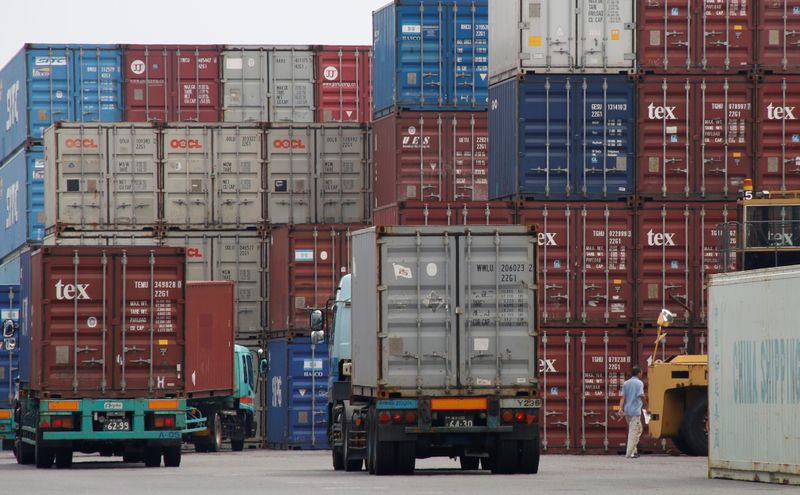By Tetsushi Kajimoto
TOKYO (Reuters) - Japan's exports plunged at a double-digit pace for the fourth month in a row in June, backing signs the coronavirus crisis has knocked the economy into its worst postwar recession and raising the spectre of a longer and more painful global downturn.
U.S.-bound Japanese shipments nearly halved again due to plummeting demand for cars and autoparts, while exports to China remained weak, pointing to the absence of a strong growth engine for the world economy.
Ministry of Finance (MOF) data showed on Monday that Japan's exports dived 26.2% in June from a year earlier, bigger than a 24.9% decline seen by economists in a Reuters poll. The contraction slowed slightly from the prior month's 28.3% fall - the worst downturn since September 2009.
Global demand for cars and other durable goods has sunk since March as the pandemic prompted many countries to lockdown.
Though more countries have now started re-opening their economies, analysts say the trade data could diminish hopes for a quick rebound in global demand and Japan's export-led economy, especially given the resurgence of coronavirus cases in major economies like the United States, Brazil and India.
The International Monetary Fund last month forecast global output will shrink by 4.9% this year, versus a 3.0% contraction predicted in April. It also predicted a slower recovery in 2021, with growth of 5.4% for the year compared with a 5.8% rise seen in April.
"Exports are likely to seesaw for the time being," said Takeshi Minami, chief economist at Norinchukin Research Institute.
"If domestic and external demand remain sluggish for a prolonged period, supply capacity could be slashed, triggering a jump in bankruptcies and job losses in the latter half of this fiscal year."
U.S.-BOUND EXPORTS TANK
The latest slump was aggravated by a massive annual decline in U.S.-bound car shipments, a major export item for the Asian giant.
Overall shipments to the United States - Japan's key market - dived 46.6%, due to 63.3% decline in exports of automobiles, 56% drop in airplane engines and 58.3% fall in car parts.
Nissan (OTC:NSANY) Motor Co (T:7201), Japan's No. 2 automaker, plans a 30% year-on-year cut in global car output through December as falling demand due to the COVID-19 pandemic complicates its turnaround efforts, two sources told Reuters.
In 2018, the United States was Japan's largest export market, followed closely by China and led by cars and car parts.
Exports to China, Japan's largest trading partner, fell 0.2% in the year to June, as declines in shipments of chip-making machinery and chemical materials more than offset increase in nonferrous metal and car shipments.
Shipments to Asia, which account for more than half of Japanese exports, declined 15.3%, and exports to the European Union fell 28.4%.
Japan slipped into recession for the first time in 4-1/2 years in the first quarter and is on course for its deepest postwar slump as the health crisis hurt businesses and consumers.
The world's third-largest economy is forecast to contract 5.3% this fiscal year, the biggest contraction since comparable data became available in 1994, followed by a 3.3% bounce next year, a Reuters poll of over 30 economists shows.
Reflecting weak demand and declining oil prices, imports fell 14.4% in the year to June, versus a 16.8% decrease seen by analysts, leading to a trade deficit of 268.8 billion yen ($2.51 billion).

The Bank of Japan has signalled confidence the economy will emerge from the slump and has ruled out the risk of deflation, although policymakers have debated such a prospect in the face of the pandemic-induced global slump in demand and prices.